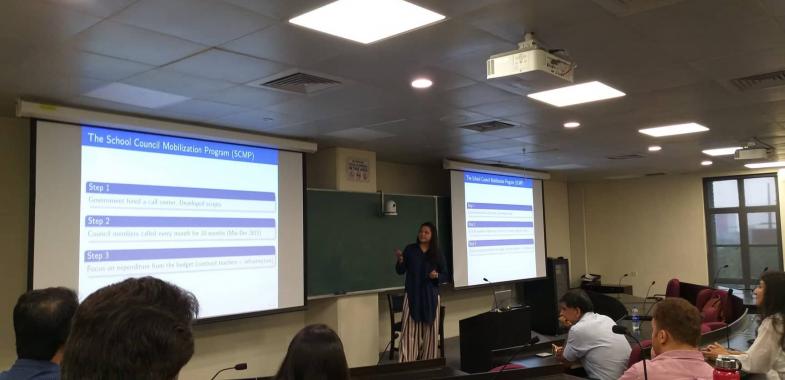
The Syed Ahsan Ali and Syed Maratib Ali School of Education (SOE) at LUMS conducted its first Brown Bag session of the new semester on September 4, 2019. Minahil Asim, a PhD candidate at the School Organisation and Education Policy (SOEP) programme at the University of California, Davis, led the session with a presentation titled, ‘Can Information Strengthen Local Governance of Schools? Evidence from Pakistan.’
Ms. Asim’s research evaluates information-based interventions for teachers, parents, and communities to improve academic achievement and the home-learning environment for students in the K-12 educational pipeline. In her job market paper, she investigates the role of information in strengthening local governance of schools. She studies how school councils, comprising teachers, parents, and community members respond to targeted and sustained information about their roles and responsibilities, and whether their response impacts student achievement in the context of Punjab, Pakistan.
Her other ongoing projects include a study of distributional effects of a literacy-based intervention targeted at parents and communities in Rwanda, an analysis of patterns of math course-taking by high school students in California and whether an information signal students receive about their college-readiness impacts course choice, and an experiment that investigates the impact of teacher expectations on student effort in the classroom in Pakistan. Ms. Asim has a Master’s degree in International and Comparative Education from Stanford University and a Bachelor’s degree in Economics, with a minor in Philosophy, from LUMS.
In her paper, she found inconclusive empirical evidence on whether information dissemination to local governance institutions such as school councils (comprising parents, teachers, and community members) on their responsibilities in schools can improve school management and educational outcomes for children in developing countries. Ms. Asim’s paper investigates this question through the School Council Mobilization Program (SCMP) in Punjab, Pakistan.
To encourage the utilisation of a non-salary budget given to school councils for school improvement activities, the provincial government of Punjab hired a call centre to make regular and targeted phone calls to council members to inform and mobilise them to expend from the budget. Using multiple data-sets and a difference-in-differences estimation strategy, she found that schools where members received the SCMP calls were 7 percent more likely to spend money, and spent 50 percent more funds in absolute terms, compared to non-SCMP schools. However, facilities did not improve and neither were additional contract teachers hired in SCMP schools - outcomes on which members were encouraged to spend the money. Worse, students in SCMP schools scored lower in Math, English, and Urdu by approximately 1/10th of a standard deviation than students in non-SCMP schools.
She discussed mechanisms such as the cosmetic nature of the programme that did not target student learning, and the programme’s impact on teacher presence and effort in the classroom, which offer insight into the adverse effects of SCMP on student test scores.
The Brown Bag session was attended by Dr. Tahir Andrabi, Dean SOE, Dr. Mariam Chughtai, Associate Dean SOE, SOE faculty, staff and MPhil Education Leadership and Management students. The session was followed by an interactive Q&A session, during which a vibrant exchange of ideas took place among the students, faculty and the presenter.







